Food: Our Basic Need - 2 Class 6 Worksheet Science
Q1: Fill in the blanks.
(i) We need fresh and clean air to ________.
Ans: breathe
Breathing is the process by which we take in oxygen from the air and expel carbon dioxide. Fresh and clean air is essential for this vital biological process.
(ii) ________ is used for drinking.
Ans: Water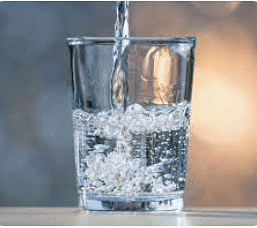 Water is a fundamental requirement for hydration and is commonly used for drinking to maintain bodily functions.
Water is a fundamental requirement for hydration and is commonly used for drinking to maintain bodily functions.
(iii) We should not eat ________ food.
Ans: stale
Stale food is food that has lost its freshness and can potentially be spoiled or unsafe to consume. Eating stale food can lead to digestive issues or foodborne illnesses.
(iv) We need ________ and ________ in rainy seasons.
Ans: raincoats, umbrellas
Raincoats and umbrellas are used to protect ourselves from getting wet during rainy seasons. They help keep us dry and comfortable when it's raining.
(v) A house protects us from ________.
Ans: wild animals
Houses provide a physical barrier and a secure environment that keeps wild animals and other potential dangers outside, ensuring our safety and security.
(vi) __________ provide energy to the body and keep us active.
Ans: Carbohydrates
Carbohydrates are one of the macronutrients in our diet, and they are a primary source of energy for the body. They are broken down into glucose, which is used for various bodily functions, including physical activity.
(vii) ____________ and ____________ are two examples of green leafy vegetables.
Ans: Spinach and kale
Spinach and kale are both nutritious green leafy vegetables known for their high vitamin and mineral content. They are often recommended for a healthy diet.
(viii) __________ is known as the "fuel of our body" because it provides energy.
Ans: Carbohydrates
Carbohydrates are a primary source of energy for the body. When consumed, they are converted into glucose, which is used by cells for energy production and various physiological processes.
(ix) Lack of ____________ can lead to a disease called scurvy.
Ans: vitamin C
Scurvy is a disease caused by a deficiency of vitamin C (ascorbic acid). Symptoms include weakness, fatigue, gum disease, and skin problems. Vitamin C is essential for collagen synthesis and overall health.
(x) Eating a variety of foods from all ____________ groups ensures a balanced diet.
Ans: food
A balanced diet includes foods from different food groups such as fruits, vegetables, grains, proteins, and dairy (or alternatives). Consuming a variety of foods from these groups ensures that the body receives a wide range of nutrients necessary for overall health and well-being.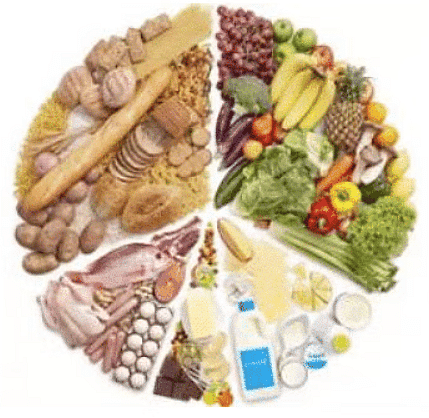
Q2: True or False.
(i) The main nutrients in food are carbohydrates, proteins, and vitamins.
Ans: False
The main nutrients in food include carbohydrates, proteins, fats, vitamins, and minerals.
(ii) Fats are an essential part of a balanced diet and should be completely avoided.
Ans: False
Fats are essential for a balanced diet and should be consumed in moderation, focusing on healthy fats found in foods like nuts, seeds, and fish.
(iii) Fruits and vegetables are rich sources of vitamins and minerals.
Ans: True
Fruits and vegetables provide a wealth of essential vitamins and minerals that support overall health and well-being.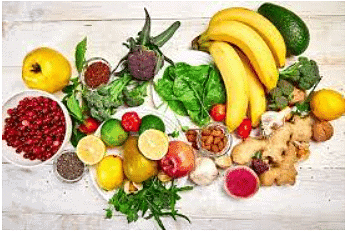
(iv) Water is necessary for the digestion of food and various body processes.
Ans: True
Water is essential for digestion, nutrient absorption, temperature regulation, and numerous bodily functions.
(v) Eating junk food occasionally is a healthy eating habit.
Ans: False
Eating junk food occasionally is not considered a healthy habit, as these foods are often high in unhealthy fats, sugars, and salt, while lacking essential nutrients.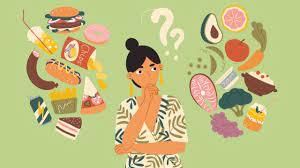
Q3: Match the Column.
 Ans: 1. Carbohydrates - B. Nutrients that provide energy to the body.
Ans: 1. Carbohydrates - B. Nutrients that provide energy to the body.
Carbohydrates are the primary source of energy for the body. They are broken down into glucose, which is used by cells for energy.
2. Proteins - A. Nutrients that repair and build body tissues.
Proteins are essential for growth and repair of body tissues, including muscles, organs, and cells. They also play a crucial role in the production of enzymes and hormones.
3. Fats - C. Nutrients that help in digestion and absorption.
Fats are essential for the absorption of fat-soluble vitamins (A, D, E, and K) and aid in the digestion of certain vitamins and minerals. They also provide a concentrated source of energy.
4. Vitamins - D. Nutrients that regulate body processes and functions.
Vitamins are organic compounds that are necessary for various biochemical processes in the body. They help in the regulation of metabolism, immune function, and other physiological functions.
5. Minerals - E. Nutrients that protect the body from diseases.
Minerals are essential for maintaining proper body functions and structures. They play a vital role in bone health, nerve function, fluid balance, and protection against certain diseases.
Q4: Short Answer Questions.
(i) Why is it essential to have a balanced diet?
Ans: It is essential to have a balanced diet because it provides all the necessary nutrients required for growth, repair, and overall well-being. A balanced diet helps in maintaining a healthy body, supports the immune system, and prevents nutritional deficiencies and related health issues.
(ii) Name three food items that are rich sources of proteins.
Ans: Three food items that are rich sources of proteins are:
- Chicken: It is a lean source of protein and contains essential amino acids.
- Lentils: They are plant-based protein sources and are also high in fiber.
- Eggs: Eggs are a complete protein source, containing all essential amino acids.
(iii) What are the functions of minerals in our body?
Ans: The functions of minerals in our body include:
- Bone health: Minerals like calcium and phosphorus are essential for maintaining strong bones and teeth.
- Nerve function: Minerals like sodium and potassium play a crucial role in nerve signal transmission.
- Fluid balance: Minerals like sodium and potassium help in maintaining proper fluid balance in the body.
- Enzyme activity: Minerals like zinc and magnesium are co-factors for many enzymatic reactions in the body.
(iv) Explain the importance of water in our daily life.
Ans: Water is essential in our daily life for several reasons:
- It helps in digestion: Water aids in breaking down food and facilitates the absorption of nutrients.
- It regulates body temperature: Sweating helps in cooling down the body during physical activity or in hot weather.
- It flushes out waste: Water helps in removing waste products and toxins through urine and sweat.
- It lubricates joints: Water provides cushioning to joints and helps them function smoothly.
(v) How can we maintain good food hygiene?
Ans: We can maintain good food hygiene by following these practices:
- Wash hands before handling food and after using the restroom.
- Keep the cooking area clean and sanitized.
- Separate raw and cooked foods to avoid cross-contamination.
- Cook food thoroughly to kill harmful bacteria and pathogens.
- Store food properly, either in the refrigerator or at appropriate temperatures, to prevent spoilage.
Q5: Answer the following questions.
(i) What are the basic needs we need to live and grow?
Ans: The basic needs we need to live and grow are air, water, food, clothes and house.
(ii) Name two of your needs.
Ans: Air and water.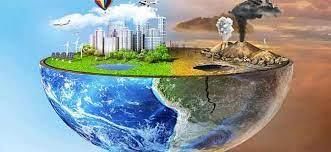
(iii) How do you protect your body from cold?
Ans: We wear woolen clothes in winter.
(iv) Why is food necessary for us?
Ans: Food is necessary for us because food give us energy to work and grow.
(v) Why do we need clean clothes?
Ans: We need clean clothes because clothes protect us from heat, cold, rain and dust.
(vi) Why should we drink fresh and clean water?
Ans: We should drink fresh and clean water because dirty water contains germs and germs spread diseases.
(vii) Why do we need a house?
Ans: We need a house because a house protects us from heat, cold, rain, animals and thieves.
|
49 videos|156 docs|34 tests
|
FAQs on Food: Our Basic Need - 2 Class 6 Worksheet Science
| 1. What are the four main components of food? |  |
| 2. Is it important to have a balanced diet? |  |
| 3. What are the consequences of not having a balanced diet? |  |
| 4. How can we ensure a balanced diet? |  |
| 5. What are some common sources of carbohydrates, proteins, and fats? |  |
















